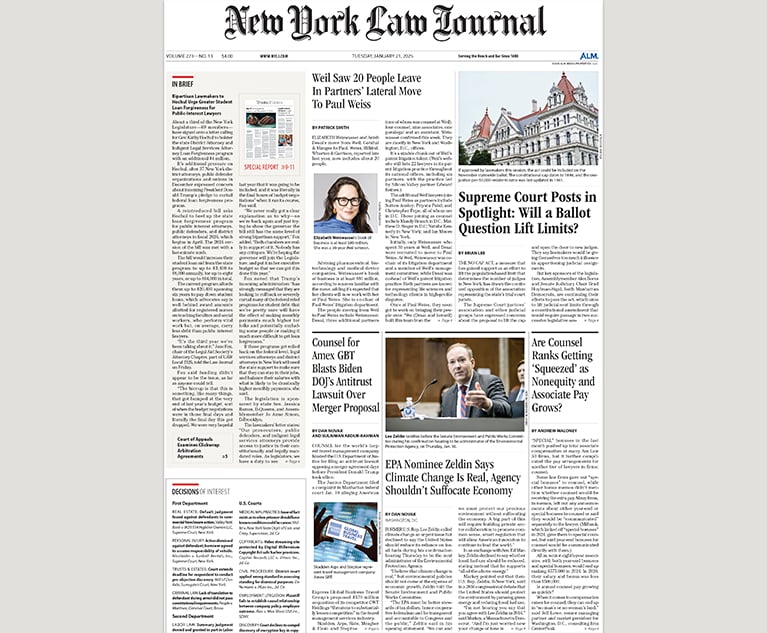GC Impact: Jose Ramon Gonzalez
"I focus on the three things I believe it takes to be an effective leader: identifying the right people for the right roles, setting those people up for success, and standing behind your people."
October 01, 2018 at 02:08 PM
4 minute read
 Photo: David Handschuh/ALM.
Photo: David Handschuh/ALM.
Jose Ramon Gonzalez, general counsel, QBE NA
Q: How is the role of general counsel evolving, and how have you adapted?
A: It is no secret that the role of the General Counsel has expanded greatly over the years. No longer do we simply stay behind the scenes passively providing advice when asked. Today's General Counsel actively integrates the legal function in all aspects of a company's affairs not only to mitigate legal risk, but to empower the business in its efforts to meet organizational goals in a manner that always protects enterprise value.
I think there are three primary ways that the General Counsel role has evolved.
First, General Counsels have had to become experts in their businesses. Understanding the company's business environment and industry ensures that General Counsels develop the appropriate level of credibility with other executive peers, and enables General Counsels to provide strategic advice tailored to the company's needs. Without this, General Counsels could not foresee how legal and regulatory changes will impact their companies.
Second, General Counsels are now responsible for overseeing their organizations' entire legal function, including managing their department and outside counsel budgets, assuming responsibility for leading large teams, demonstrating enterprise value and driving efficiencies within their teams.
In today's world, companies often turn to data to drive their decision-making. In our department, we've developed metrics that enable us to measure departmental performance and the value our department adds to the company in concrete—as opposed to esoteric—terms.
One area where we use metrics is to measure the performance of the attorneys who provide legal advice to claims professionals on insurance coverage issues against our company's prior practice of retaining outside law firms to perform that same function. Based upon that comparison, we saw that our in-house coverage group performs work more efficiently and economically than their external counterparts do. That, in turn, led to our department to realize millions of dollars' worth of savings in 2017 alone.
Finally, technological change and market demands require real-time legal support. Legal departments consequently have had to reorient their activities to be much more proactive in nature. One way that I've adapted to this new reality is to deploy members of our department within our company's business units to provide legal, regulatory, and compliance advice and analysis on the ground, as needed. Our business unit support attorneys sit with their internal clients as opposed to sitting away from them, ensuring our attorneys' availability to answer questions and spot issue as they arise.
Q: How do you find it most effective to develop leadership skills, and to foster them in others?
A; Like with anything else, the most effective way to develop and hone leadership skills is to practice them. As for what to practice, I focus on the three things I believe it takes to be an effective leader: identifying the right people for the right roles, setting those people up for success, and standing behind your people.
Choosing the right people for the right roles sounds easy, but it can be difficult to execute. After all, a great coordinator may not make a good head coach. Setting those people up for success is important because you need to make sure that the right people are communicating with one another, and that your team members are aware of any “unwritten rules” that potentially could impact how their message is received by stakeholders. Standing behind your team is critical because it builds greater alignment to the overall mission, and it fosters loyalty among the team. If I were to point to one thing that best helps accomplish all these things, it would be to ensure open lines of communication where team members know what's expected of them and what they should expect from you.
As for fostering leadership skills in others, you have to lead by example. If you don't, you'll never have credibility as a leader.
Q: What is your best advice for in-house lawyers trying to make an impact, with their corporate clients and beyond?
A: It's a given that attorneys need to have strong organizational, writing and communication skills. What differentiates good lawyers from great ones, both in-house and elsewhere, is being strategic about how the lawyer delivers his or her services. Good lawyers answer the question asked. Great lawyers do that and have the answer for the next question ready before the client even asks.
This content has been archived. It is available through our partners, LexisNexis® and Bloomberg Law.
To view this content, please continue to their sites.
Not a Lexis Subscriber?
Subscribe Now
Not a Bloomberg Law Subscriber?
Subscribe Now
NOT FOR REPRINT
© 2025 ALM Global, LLC, All Rights Reserved. Request academic re-use from www.copyright.com. All other uses, submit a request to [email protected]. For more information visit Asset & Logo Licensing.
You Might Like
View All

Alston & Bird Adds M&A, Private Equity Team From McDermott in New York
4 minute readTrending Stories
- 1Democracy in Focus: New York State Court of Appeals Year in Review
- 2In Vape Case, A Debate Over Forum Shopping
- 3SDNY Criminal Division Deputy Chief Returns to Debevoise
- 4Brownstein Adds Former Interior Secretary, Offering 'Strategic Counsel' During New Trump Term
- 5Tragedy on I-95: Florida Lawsuit Against Horizon Freight System Could Set New Precedent in Crash Cases
Who Got The Work
J. Brugh Lower of Gibbons has entered an appearance for industrial equipment supplier Devco Corporation in a pending trademark infringement lawsuit. The suit, accusing the defendant of selling knock-off Graco products, was filed Dec. 18 in New Jersey District Court by Rivkin Radler on behalf of Graco Inc. and Graco Minnesota. The case, assigned to U.S. District Judge Zahid N. Quraishi, is 3:24-cv-11294, Graco Inc. et al v. Devco Corporation.
Who Got The Work
Rebecca Maller-Stein and Kent A. Yalowitz of Arnold & Porter Kaye Scholer have entered their appearances for Hanaco Venture Capital and its executives, Lior Prosor and David Frankel, in a pending securities lawsuit. The action, filed on Dec. 24 in New York Southern District Court by Zell, Aron & Co. on behalf of Goldeneye Advisors, accuses the defendants of negligently and fraudulently managing the plaintiff's $1 million investment. The case, assigned to U.S. District Judge Vernon S. Broderick, is 1:24-cv-09918, Goldeneye Advisors, LLC v. Hanaco Venture Capital, Ltd. et al.
Who Got The Work
Attorneys from A&O Shearman has stepped in as defense counsel for Toronto-Dominion Bank and other defendants in a pending securities class action. The suit, filed Dec. 11 in New York Southern District Court by Bleichmar Fonti & Auld, accuses the defendants of concealing the bank's 'pervasive' deficiencies in regards to its compliance with the Bank Secrecy Act and the quality of its anti-money laundering controls. The case, assigned to U.S. District Judge Arun Subramanian, is 1:24-cv-09445, Gonzalez v. The Toronto-Dominion Bank et al.
Who Got The Work
Crown Castle International, a Pennsylvania company providing shared communications infrastructure, has turned to Luke D. Wolf of Gordon Rees Scully Mansukhani to fend off a pending breach-of-contract lawsuit. The court action, filed Nov. 25 in Michigan Eastern District Court by Hooper Hathaway PC on behalf of The Town Residences LLC, accuses Crown Castle of failing to transfer approximately $30,000 in utility payments from T-Mobile in breach of a roof-top lease and assignment agreement. The case, assigned to U.S. District Judge Susan K. Declercq, is 2:24-cv-13131, The Town Residences LLC v. T-Mobile US, Inc. et al.
Who Got The Work
Wilfred P. Coronato and Daniel M. Schwartz of McCarter & English have stepped in as defense counsel to Electrolux Home Products Inc. in a pending product liability lawsuit. The court action, filed Nov. 26 in New York Eastern District Court by Poulos Lopiccolo PC and Nagel Rice LLP on behalf of David Stern, alleges that the defendant's refrigerators’ drawers and shelving repeatedly break and fall apart within months after purchase. The case, assigned to U.S. District Judge Joan M. Azrack, is 2:24-cv-08204, Stern v. Electrolux Home Products, Inc.
Featured Firms
Law Offices of Gary Martin Hays & Associates, P.C.
(470) 294-1674
Law Offices of Mark E. Salomone
(857) 444-6468
Smith & Hassler
(713) 739-1250








